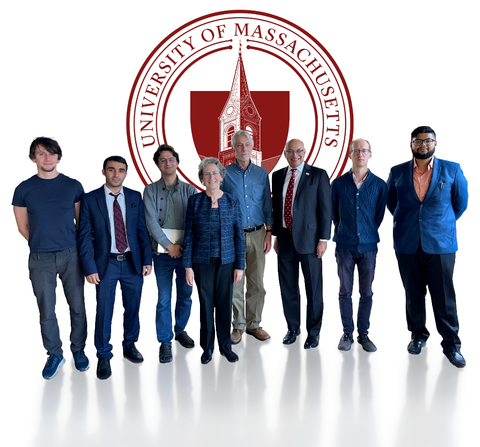Quantum computing stands at the forefront of groundbreaking computer research today. Spearheaded by Don Towsley, a Distinguished Professor at the Manning College of Information and Computer Sciences (CICS), an interdisciplinary team at the University of Massachusetts Amherst is actively contributing to this transformative field.
 Don Towsley stands at the center of the team helping to design the quantum computing network of the future. Image Credit: University of Massachusetts Amherst
Don Towsley stands at the center of the team helping to design the quantum computing network of the future. Image Credit: University of Massachusetts Amherst
The infrastructure needed to support future city-scale quantum networks is being designed by Towsley and his colleagues at UMass in the College of Engineering and CICS. This work is being managed by the Center for Quantum Networks, a $26 million, five-year, renewable project headed by the University of Arizona, one of the Engineering Research Centers of the National Science Foundation.
Compared to the bit-based computing that is performed, quantum computing is very different. A bit denotes an electrical current, either on or off, and is commonly expressed as a 0 or a 1. The software, websites, and emails that make up the electronic world are built on bits. Thousands of them make up even the most basic digital artifacts; this story, for example, has over 170,000 bits.
In contrast, “quantum bits,” or “qubits,” are the building blocks of quantum computing. They resemble regular bits but represent particles in a quantum state. Because of the drastically different behavior of matter in a quantum state, qubits are not limited to being either ones or zeroes, on or off.
Although they are not magical, Stefan Krastanov, an Assistant Professor of Information and Computer Sciences at UMass Amherst and one of the researchers contributing to the design of the quantum network, notes that their different behavior opens up a range of computing possibilities.
For many computing problems, quantum computers are no more powerful than conventional ones. However, for a growing family of important problems like drug discovery, cryptography, and scientific simulations, only quantum algorithms have a chance of providing solutions.
Stefan Krastanov, Assistant Professor, Department of Information and Computer Sciences, University of Massachusetts Amherst
The ability of matter to become “entangled” is one of the more peculiar features of the quantum state. Here, the game of pool serves as a useful analogy. In the real world, the three-ball goes into the corner pocket when the cue ball strikes it. However, in a quantum world, the three balls might be entangled with another ball, like the eight ball, in this case, both the eight and the three would react simultaneously to the cue, even though the eight ball was not touched.
Entangling quantum computers through a quantum internet could offer unparalleled digital security—a primary focus of the Center for Quantum Networks' research, while also significantly enhancing the computing capabilities of current top-tier machines.
However, for any of this to occur, a secure quantum network that is capable of connecting quantum computers and sending entangled qubits is required.
The problem, “is that quantum information- those qubits - is incredibly fragile and very sensitive to environmental noise, such as heat. This requires the careful design of a network architecture, algorithms, and protocols to protect against this noise.
Don Towsley, Professor, Manning College of Information and Computer Sciences
Towsley is working with colleagues at UMass, including Krastanov and Assistant Professor of Information and Computer Science Filip Rozpedek, as well as Assistant Professor of Electrical and Computer Engineering Taqi Raza in the College of Engineering, to figure out how to send qubits securely without having to worry about them being lost or decaying.
This problem calls for computer science and engineering knowledge since, in the words of Raza, whose area of expertise is critical infrastructure security, “Security cuts across all the various specialties that must contribute to a successful quantum network. We are working to embed security principles in quantum networks from the start.”
Quantum computing is not just an advance in technology. It’s a paradigm shift in how we process information. We’re proud contributors to this thrilling journey to usher in the next era of computing. NSF’s recognition of UMass Amherst as a key hub in the northeast amplifies our sense of pride and highlights the significant role our talented researchers play in advancing the field.
Laura Haas, Donna M. and Robert J. Manning Dean, Manning College of Information and Computer Sciences
Towsley is spearheading the establishment of a UMass Amherst center of excellence to support research in quantum information systems, which will work to develop a quantum internet and provide network security to connect quantum computers, thanks to a seed fund established by anonymous donors, including a gift of $5 million.
Sanjay Raman, Dean, College of Engineering, College of Information and Computer Sciences, states, “Our role as a core institution in the NSF Center for Quantum Networks is part of a broader, growing interdisciplinary initiative in quantum information systems here at UMass, involving faculty and researchers in CICS, Electrical and Computer Engineering, and Physics in the College of Natural Sciences.”
“Between the three colleges, we have nine core faculty in the quantum information systems area, working on everything from quantum materials, devices, and circuits to algorithms and security, and many others who are helping to explore the science and applications of the quantum world,” concludes Sanjay Raman.